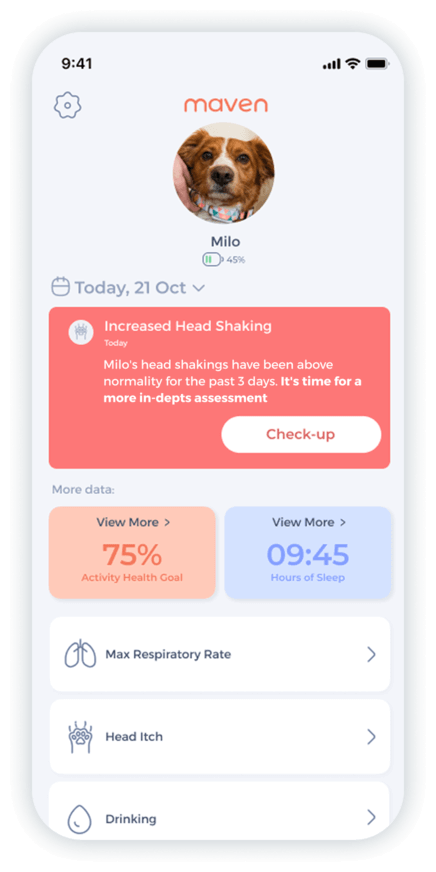Why Won’t My Dog Stop Scratching? Common Triggers and Relief
“My dog is constantly scratching and biting himself! I don’t think this is normal, and I don’t know if it’s allergies, fleas, or something more serious. What can I do?”
Many pet owners have found themselves in this situation once or twice, but there’s no reason to worry. There are several common causes for such excessive scratching, and we’re here to tell you all about them.
You’ll learn to determine if the cause is a mild irritation or a more serious immune or skin condition. We’ll also give you some tips and tell you when it’s time to call the vet.
Lastly, you’ll see how Maven Pet can help you stay proactive, so you can react on time or prevent some problems entirely.
Key takeaways:
- Excessive itching in dogs is called pruritus, and this symptom can stem from various skin disorders and skin allergies.
- Common causes for your dog’s excessive scratching include dry skin, allergy, skin parasites, and skin infection.
- You should start worrying when scratching lasts long or causes noticeable changes in the dog’s behavior or on their skin.
- There are various at-home remedies and OTC solutions to try depending on the underlying cause.
- You should always call your vet if the scratching is persistent and you can’t find the cause.
- It’s best to stay proactive by monitoring behavior and skin health, and that’s where Maven Pet’s monitor can help.
Why Is My Dog Itching So Much? Pruritus Explained
Excessive itching in dogs is called pruritus. It’s just a medical term, and pruritus is effectively a part of many skin disorders, but it’s also associated with a flea allergy and other allergic skin conditions.
Pruritus is often accompanied by red and inflamed skin areas. These can further evolve into a skin bacterial infection or pyoderma. However, this too can mask other underlying problems.
“I got the Maven sensor for my 14-year-old Chihuahua mix with heart and trachea issues. It gave me back peace of mind – I can track her RRR, BPM, drinking, and activity anytime and know instantly if something’s wrong. Highly recommend!”

★★★★★
Chiara De Luca
Titti
Common Causes of Itching, Scratching, and Biting in Dogs
Various common health problems can lead your dog to itch and scratch or bite excessively, most notably:
- Dry skin during weather changes or from frequent bathing, which also tends to manifest in redness, scabs, flaky skin, dandruff, and itchy skin spots
- An allergy or environmental trigger, like house mites, pollen, and mould spores
- A food allergy, which tends to come with other symptoms like vomiting or diarrhea
- A skin parasite like fleas, mange mites, lice, ticks, but also bites from bugs like mosquitoes
- A skin or ear infection from bacteria or fungi, which can also come with other symptoms like sticky or oozing areas, bad smell, swelling, or hair loss
- Contact dermatitis, which comes from something the dog touched, like a strong detergent, fertilizer, or another chemical
- Stress or anxiety, which manifests in many ways, with excessive scratching being one of them
In other cases, excessive itching and scratching might even be a sign of a different health condition, like an autoimmune disease or a hormonal imbalance.
When Should I Start Worrying? Signs It’s More Than Just an Itch

Ocassional itching is normal, and even if the dog starts scratching more than usual, it could pass on its own. However, if you notice some of the following, then it’s time to consider applying some relief and calling your vet for more advice:
- Too frequent or prolonged scratching that lasts for more than a couple of days
- Intense scratching that’s not allowing your pup to sleep or gets them overly agitated
- Behavioral changes like your pooch being anxious, withdrawn, or not its usual self
- A visible change on the skin, like a sore spot, rash, redness, bump, or inflammation
- Irritated, red, and moist hot spots on skin that start growing and becoming more and more painful
- Swelling somewhere on the body, especially around the dog’s face
- Loss of hair caused by constant scratching, which might also lead to bald patches or a thinner coat
At-Home Relief Tips for Mild Itching
If your dog is scratching too much, the first thing you should do is check the skin, especially the part where they’re scratching and biting the most. That’s because the cause might be obvious, like fleas or an attached tick.
- If it’s a tick, remove it the correct way
- If it’s fleas, get a good OTC flea treatment product
If it’s an environmental cause, consider making adjustments, like avoiding peak pollen times if pollen is the issue, or using an air purifier if house mites are the problem. There are also prescription medications for this.
If you think the cause is stress or anxiety, the best solution is to get your pup to exercise or play more, and you can also try some positive reinforcement training.
If you can’t tell the cause, and your dog is not too itchy, you can also try some simple home remedies like a bath with a specialized shampoo. You can also try an oatmeal bath because oatmeal has an anti-inflammatory, moisturizing, and soothing effect on the skin.
Omega-3 fatty supplements can also prove useful here as they can reduce skin inflammation and support health.
Even though food allergies aren’t overly common in dogs, you can also change the pup’s diet and add proteins they haven’t tried before.
When Should I Call the Vet?

You don’t need to bother your vet if the cause is a mild irritation or something you can easily fix on your own. However, if you’re unsure of what to do or if your current approach isn’t helping, and the dog continues to scratch, it’s best to call your vet.
“Persistent scratching, especially if it’s disrupting your dog’s rest or causing skin damage, should never be ignored. It could be the sign of an underlying condition that needs treatment.” — Joana Babo, DVM, Veterinarian at Maven Pet
Why You Should Monitor Behavior and Skin Health, and How Maven Can Help With Itch Tracking
Monitoring your pup’s skin health and behavior, especially with the use of a pet health tracker like the one Maven Pet offers, is key in early detection of potential health problems. Moreover, it helps in ensuring your pooch’s overall well-being.


Monitor heart rate, respiratory rate, activity & rest, drinking, itch behavior.
A change in behavior, like a weaker appetite and decreased activity, can point to stress, pain, and illness. At the same time, a skin issue can point to an allergy, infection, or some other condition.
You can track all of this through Maven Pet’s pet health app and even record behavior like scratching, while the app can notify you if a significant change warrants a visit to the vet.
Conclusion
Constant scratching and itching can be a minor problem that will either go away on its own or warrant an easy OTC solution or home remedy. However, excessive scratching, especially with added symptoms, can be a sign of a bigger problem that requires more attention and a visit to the vet.
Maven Pet’s dog health tracker can help you stay proactive, but even warn you when certain behavioral changes or health indicators require your attention. The key is to monitor your dog’s health closely for this and other issues, and to react promptly when problems arise, ensuring your pup stays at optimal health.
Maven Pet focuses on improving the quality of life of our pets with technology, using artificial intelligence (AI) to enable proactive pet care. By accurately collecting and monitoring pet data 24/7 and flagging any irregularities, Maven Pet empowers pet parents and veterinarians to stay ahead of potential health issues, ensuring the well-being and longevity of our beloved companions.




